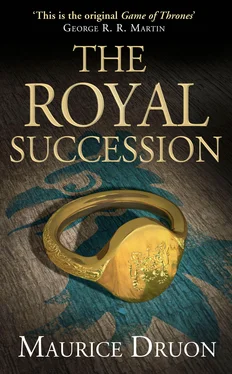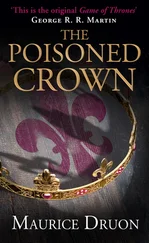Henceforth no one would look on her wonderful golden hair, on the perfect oval of her face, and on the calm, lustrous splendour which had struck all beholders and made her beauty famous.
The narrow and pathetic mask, framed in its immaculate linen, bore the marks of sleepless nights and days of weeping. Even her gaze had altered, never coming to rest but seeming to flutter across the surface of people and of things. The lovely Queen Clémence already looked like the effigy on her tomb.
Nevertheless, beneath the folds of her dress, a new life was forming: Clémence was pregnant; and she was obsessed by the thought that her husband would never know his child.
‘If only Louis had lived long enough to see his child born!’ she thought. ‘Five months, only five months longer! How happy he would have been, particularly if it is a son. If I had only become pregnant on our wedding night!’
The Queen turned wearily to look at the Count of Valois, who was strutting up and down the room like a cock on a dunghill.
‘But why, Uncle, why should anyone have been so wicked as to poison him?’ she asked. ‘Did he not do all the good in his power? Why are you always searching for the wickedness of man where, doubtless, there is but a manifestation of the Divine Will?’
‘You are on this occasion alone in rendering to God that which seems rather to belong to the machinations of the Devil,’ replied Charles of Valois.
The great crest of his hood falling on his shoulder, his nose strong, his cheeks bloated and high of colour, his stomach thrust well to the fore, dressed in the same suit of black velvet with silver clasps which he had worn eighteen months earlier at the funeral of his brother Philip the Fair, Monseigneur of Valois had just returned from Saint-Denis, where he had been burying his nephew, Louis X. The ceremony had created a problem or two for him, because, for the first time since the ritual of royal burials had been established, the officers of the household, having cried: ‘The King is dead!’ had been unable to add: ‘Long live the King!’; and no one knew before whom the various rites, normally appropriate to the new sovereign, should be performed.
‘Very well! Break your wand before me,’ Valois had said to the Grand Chamberlain, Mathieu de Trye. ‘I am the eldest of the family and take precedence.’
But his half-brother, the Count of Evreux, had taken exception to this peculiar innovation, for Charles of Valois would certainly have taken advantage of it as an argument for his being recognized as Regent.
‘The eldest of the family, if you mean it in that sense,’ the Count of Evreux had said, ‘is not you, Charles. Our Uncle Robert of Clermont is the son of Saint Louis. Have you forgotten that he is still alive?’
‘You know very well that poor Robert is mad and that his clouded mind cannot be relied on in anything,’ Valois had replied, shrugging his shoulders.
In the end, after the funeral feast, which had been held in the abbey, the Grand Chamberlain had broken the insignia of his office before an empty chair.
‘Did not Louis give alms to the poor? Did he not pardon many prisoners?’ Clémence went on, as if she were trying to convince herself. ‘He had a generous heart, I assure you. If he sinned, he repented.’
It was clearly not the moment to contest the virtues with which the Queen embellished the recent memory of her husband. Nevertheless, Charles of Valois found it impossible to control an outburst of ill-humour.
‘I know, Niece, I know,’ he replied, ‘that you had a most pious influence on him, and that he was extremely generous … to you. But one cannot rule by Paternosters alone, nor by heaping presents on those one loves. Repentance is not enough to disarm the hatreds one has sown.’
‘So now,’ Clémence thought, ‘Charles, who laid a claim to power while Louis was alive, is denying him already. And soon I shall be reproached with all the presents he gave me. I have become the foreigner.’
She was too weak, too overcome to find the strength for indignation. She merely said: ‘I cannot believe that Louis was so hated that anyone would wish to kill him.’
‘All right, don’t believe it, Niece,’ cried Valois; ‘but it’s the fact! There’s the proof of the dog that licked the linen used for removing the entrails during the embalming and died an hour later. There’s …’
Clémence closed her eyes and clutched the arms of her chair in order not to reel at the vision it conjured up in her mind. How could anyone speak so cruelly of her husband, the King who had slept beside her, the father of the child she carried, compelling her to imagine the corpse beneath the knives of the embalmers?
Monseigneur of Valois continued to develop his macabre thesis. When would he stop talking, that fat, restless, vain authoritarian who, dressed sometimes in blue, sometimes in red, sometimes in black, had appeared at every important or tragic hour in Clémence’s life during the ten months she had been in France, to lecture her, deafen her with words and compel her to act against her will? Even on the morning of her marriage at Saint-Lyé, Uncle Valois, whom Clémence had scarcely ever seen, had almost spoiled the ceremony by instructing her in court intrigues of which she understood nothing. Clémence remembered Louis coming to meet her on the Troyes road, the country church, the room in the little castle, so hastily furnished as a nuptial chamber. ‘Did I realize my happiness? No, I must not weep in front of him,’ she thought.
‘Who the author of this appalling crime may be,’ went on Valois, ‘we do not yet know; but we shall discover him, Niece, I give you my solemn promise. If I am given the necessary powers, that is. We kings …’
Valois never lost an opportunity of reminding people of the fact that he had worn two crowns, which, though they were purely nominal, still put him on an equal footing with sovereign princes. 1, fn1
‘We kings have enemies who are less hostile to our persons than to the decisions of our power; and there are many people who might have an interest in making you a widow. There are the Templars, whose Order, as I said at the time, it was a great mistake to suppress. They formed a secret conspiracy and swore to kill my brother and his sons. My brother is dead, his eldest son has followed him. There are the Roman Cardinals. Do you remember Cardinal Caetani’s attempt to cast a spell on Louis and your brother-in-law of Poitiers, both of whom he wished to destroy? The attempt was discovered, but Caetani may well have struck by other means. What do you expect? One cannot remove the Pope from the throne of Saint Peter, as my brother did, without arousing resentment. It is also possible that supporters of the Duke of Burgundy may still feel bitter about Marguerite’s punishment, to say nothing of the fact that you replaced her.’
Clémence looked Charles of Valois straight in the eye, which embarrassed him and made him flush a little. He had had some hand in Marguerite’s murder. He now realized that Clémence knew it; through Louis’s rash confidences no doubt.
But Clémence said nothing; it was a subject she was chary of broaching. She felt that she was involuntarily to blame. For her husband, whose virtues she boasted, had nevertheless had his first wife strangled so that he might marry her, Clémence, the niece of the King of Naples. Need one look further for the cause of God’s punishment?
‘And then there is your neighbour, the Countess Mahaut,’ Valois hurried on, ‘who is not the woman to shrink from crime, even the worst …’
‘How does she differ from you?’ thought Clémence, not daring to reply. ‘Nobody seems to shrink much from killing at this Court.’
‘And less than a month ago, to compel her to submit, Louis confiscated her county of Artois.’
Читать дальше












